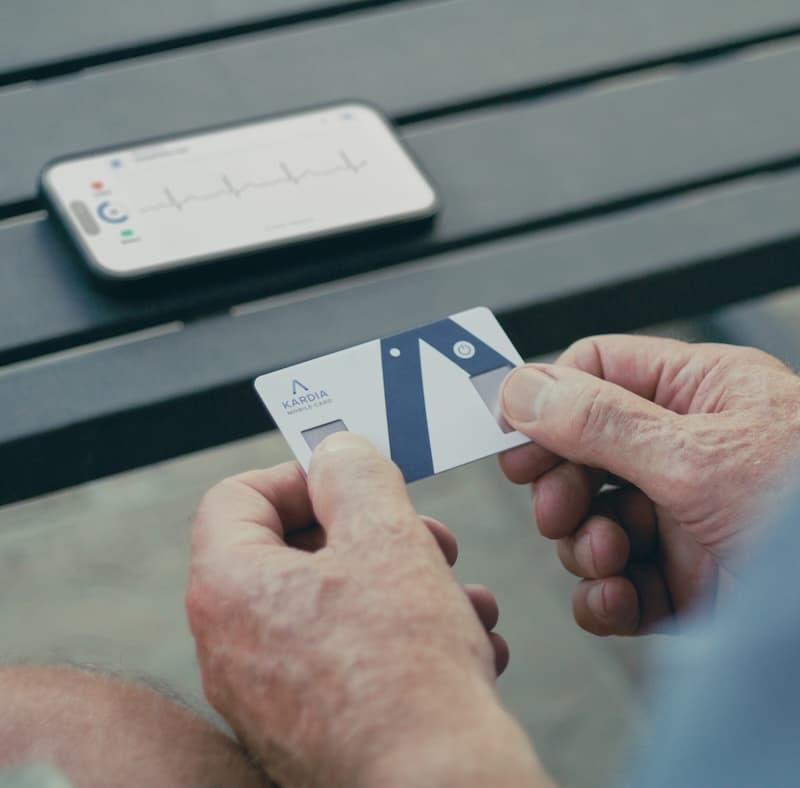Featured Posts

In the news
Hear cardiologist Dr. TJ Trad share his story of how KardiaMobile Card helped a man mid-flight who was experiencing symptoms of a serious heart event. Read the full story from CNN.

Being diagnosed with atrial fibrillation can be a life-changing event, but with these five helpful steps, you can take control of your life and keep your AFib in check.

KardiaCare’s Advanced Determinations can detect a wider range of arrhythmias and give you a deeper look at your heart rhythm.

High blood pressure, or hypertension, is a leading cause of AFib in adults. Discover why it happens and how to manage your symptoms to improve your long-term health.

Have you ever felt jittery after drinking a cup of coffee or tea? Learn how caffeine may impact your heart health.

The systems of your body work in harmony. This is especially true when it comes to how your heart functions with your respiratory system, with AFib often complicating that relationship. Discover how AFib can affect the lungs, and what you can do to breathe easier.

Catching AFib early on goes a long way in helping maintain your long-term health. In order to do so, it’s important you know the warning signs. Here are four things to look out for to determine if you might have AFib.

Adopting a new diet isn’t a one-size-fits-all solution for atrial fibrillation, but it can go a long way in minimizing episodes and progression of the condition. Here are some diets, principles, and tips that are effective in treating AFib.

Just because you’re diagnosed with AFib, doesn’t mean your commitment to living a healthy and active lifestyle should slow down. Get helpful tips for how to exercise with AFib and discover a program that will work best for you.

When you’re diagnosed with AFib, you can feel alone and isolated. Fortunately, there’s a massive community offering knowledge, support, and help every step of the way. Find out more about helpful AFib resources here.

There’s an undeniable connection between the health of your heart and the function of your brain. It’s important to understand how treating AFib can increase the risk of being diagnosed with memory issues like dementia.

Drinking alcohol if you are diagnosed with AFib is different for everyone, but there are some important things everyone should know to determine if you can drink alcohol in moderation or whether you should abstain entirely.

Understanding atrial fibrillation or AFib is key to knowing how to treat it. Learn more about why it happens, common symptoms, the different types, and more to help determine if you might have AFib.

Understand how exercise can improve your heart health and get tips for maintaining an exercise routine.

AFib symptoms have a lot in common with anxiety symptoms. In fact, they can be so similar that you may not know whether you’re experiencing an AFib episode or a panic attack. Knowing the similarities, differences, and links between the two can help prevent potential complications.

AFib affects everyone differently, especially when it comes to your energy levels. Once you understand how AFib impacts your daily routine, you can apply strategies and techniques to boost your energy and take control of your life.

Understand how the hormone changes that occur with menopause can impact risk factors for heart health.

Stress is a part of life. Unfortunately, stress often causes a majority of AFib episodes. The good news is there are many ways to handle the stress in your life, which in turn, reduces how it impacts your AFib. Read on to learn how.

While AFib is broadly defined as an irregular heartbeat, there are actually three distinct forms of the heart condition. Learn more about the three types of AFib and the specific ways to treat them.

You’ve probably heard of the cardiac diet, but what does that entail? Learn more about incorporating heart-healthy foods and cooking techniques into your diet.

Bradycardia is one of the most common arrhythmias. Learn more about bradycardia and how to help detect and manage it.

Tachycardia is one of the most common arrhythmias. Learn more about the different types of tachycardia and how to help detect and manage it.

While heart problems like AFib are often associated with aging, the truth is AFib can affect people at any point in life—even if you’re young. Read on to understand why it happens and the challenges surrounding AFib in young adults.

AFib can often be mistaken for other disorders, which makes properly diagnosing AFib complicated. Learn more about how AFib is usually diagnosed and why it may be mistaken for other health or heart conditions.













